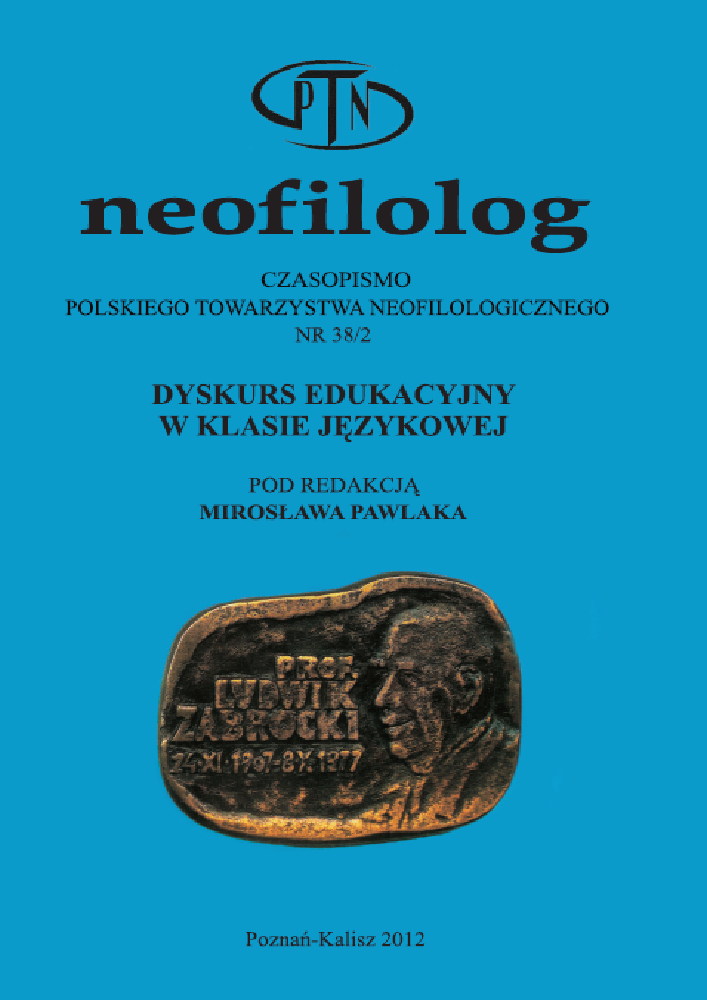Abstrakt
Metalinguistic discourse is the most common type of foreign language class-room discourse. It is commonly used by teachers in order to give explana-tions on language use, forms and meanings. While teachers dominate in this kind of discourse, students seem to remain passive. How can we promote students’ communicative and cognitive activity? This article focuses on teach-ers’ and learners’ strategies for negotiation of meaning in the case of written input. An analysis of four lessons of French as a foreign language recorded in a secondary bilingual school in Warsaw was carried out in order to reveal the metalinguistic strategies that enhance the discursive co-operation between the participants and, in this way, co-construction of meaning.
Bibliografia
Bange, P. 1992. „A propos de la communication et de l’apprentissage en L2, notamment dans ses formes institutionnelles”. [w:] Acquisition et Interaction en Langue Etrangère 1: 53-85.
Barnes, D. 1988: Nauczyciel i uczniowie. Od porozumiewania się do kształcenia. War-szawa: WSiP.
Chaudron, C. 1988. Second language classrooms. Oxford: Oxford University Press.
Cicurel, F. 1998. „Interactions et enseignement des langues”. [w:] Les Cahiers Pédagogiques 360: 23-25.
Cicurel, F. 1984. Parole sur parole ou le métalangage en classe de langue. Paris: CLE International.
Dakowska, M. 2001. Psycholingwistyczne podstawy dydaktyki języków obcych. Warsza-wa: Wydawnictwo Naukowe PWN.
Edmondson, W. J. 1985. „Discourse worlds in the classroom and in foreign language learning”. [w:] Studies in Second Language Acquisition 7: 159-168.
Ellis, R. 1990. Instructed second language learning. Oxford: Blackwell.
Faerch C. 1985. „Meta talk in FL classroom discourse”. [w:] Studies in Second Language Acquisition 7: 184-199.
Klus-Stańska, D. 2000. Konstruowanie wiedzy w szkole. Olsztyn: Wydawnictwo Uniwersytetu Warmińsko-Mazurskiego.
Kozłowska, K. i Raciborska, D. 1999. Program nauczania języka francuskiego w gim-nazjum i liceum profilowanym w klasach dwujęzycznych z językiem francuskim. Konsultacja: Z. Dzięgielewska.
Long, M. H. 1996. „The role of linguistic environment in second language acquisi-tion”. [w:] Ritchie, W. C. i Bhatia, T. K. (red.). Handbook of language acquisi-tion: Vol. 2. Second language acquisition. New York: Academic Press. 413-468.
Long, M. H. 1983. „Native speaker/non-native speaker conversation and the negotiation of comprehensible input”. [w:] Applied Linguistics 4: 126-141.
Nowicka, M. 2000. Sprawność komunikacyjna dzieci w interakcjach szkolnych. Olsztyn: Wyd. Uniwersytetu Warmińsko-Mazurskiego.
Sztejnberg, A. 2006. Komunikacyjne środowisko nauczania i uczenia się. Wrocław: Wydawnictwo Astrum.
Van Lier, L. 1996. The classroom and the language learner: Ethnography and second lan-guage classroom research. New York, London: Longman.
Vion, R. 1992. La communication verbale. Paris: Hachette.
Weiss, F. 1984. „Types de communication et activites communicatives en classe”. [w:] Le Français dans le Monde 183: 47-51.
Zając, M. 1997. „Niektóre psychologiczne aspekty badań nad dyskursem eduka-cyjnym”. [w:] Rittel, T. (red.). Dyskurs edukacyjny (materiały z Konferencji 10-11 VI 1995). Kraków: Edukacja. 97-105.
Żydek-Bednarczuk, U. i Zeler, B. 1997. „Strategia i komunikacja w dyskursie edukacyjnym”. [w:] Rittel, T. (red.). Dyskurs edukacyjny (materiały z Konferen-cji 10-11 VI 1995). Kraków: Edukacja. 39-51.
Piotrowski, S. 2006. Gestion des tâches et mode d’accès à la langue. L’apprentissage du français en milieu institutionnel polonais. Lublin: Towarzystwo Naukowe KUL.
Piotrowski, S. 2009. „Quelle compétence pour une communication autonome en classe de L2? ”. [w:] Szymankiewicz, K. i Zając, J. (red.). Développer les compétences multiples chez l’apprenant et chez l’enseignant en classe de FLE. War-szawa: Instytut Romanistyki UW. 53-60.
Schmidt, R. 1990. „The role of consciousness in second language learning”. [w:] Applied Linguistics 11: 129-158.
Licencja
Prawa autorskie (c) 1970 Krystyna Szymankiewicz

Utwór dostępny jest na licencji Creative Commons Uznanie autorstwa – Bez utworów zależnych 4.0 Międzynarodowe.
Przedstawiany utwór (artykuł) upubliczniany jest na podstawie umowy z autorem i na licencji Creative Commons Attribution-NoDerivatives 4.0 International (CC BY-ND 4.0).
Użytkownicy mają obowiązek podania wraz z rozpowszechnionym utworem, informacji o autorstwie, tytule, źródle (odnośniki do oryginalnego utworu, DOI) oraz samej licencji;
- bez tworzenia utworów zależnych,
- utwór musi być zachowany w oryginalnej postaci.
Uniwersytet im. Adama Mickiewicza w Poznaniu zachowuje prawo do czasopisma jako całości (układ, forma graficzna, tytuł, projekt okładki, logo itp.).
